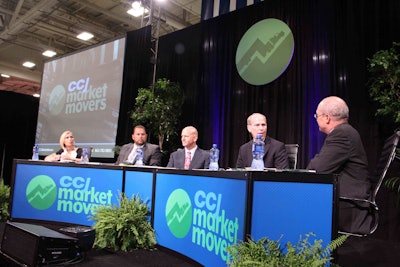 CCJ’s Market Movers was hosted by Donald Broughton of Avondale Partners (far right) and CNBC anchor Morgan Brennan (far left). Panelists included Werner’s Derek Leathers (second from left), David Parker of Covenant and Richard Stocking of Swift.
CCJ’s Market Movers was hosted by Donald Broughton of Avondale Partners (far right) and CNBC anchor Morgan Brennan (far left). Panelists included Werner’s Derek Leathers (second from left), David Parker of Covenant and Richard Stocking of Swift.“I don’t care if you’re running 50 trucks or 5,000, you have a driver problem,” Covenant Transportation Group Chairman David Parker told attendees at CCJ Market Movers, a new town-hall style event held Thursday, Aug. 27, during the Great American Trucking Show in Dallas. CNBC Reporter Morgan Brennan and Avondale Partners’ Donald Broughton, moderated the program.
Parker and fellow panelists Derek Leathers, president and COO of Werner Enterprises and Richard Stocking, president and COO of Swift, agreed that the driver shortage – a shortfall projected at nearly 40,000 – is real. Trucking must continue to make changes to address the issue, such as improving home time, working conditions and pay, they said.
“It’s just math,” said Leathers. “We have more people retiring in the baby boomer generation and fewer people entering the workforce.” Compounding the demographic realities are the American belief that everyone must go to college, and the fact that many high schools have eliminated vocational programs that might encourage graduates to consider other alternatives, Leathers said.
“The irony is that many college grads come out and take jobs that pay less than truck drivers or technicians,” he said. Despite that fact, Covenant’s Parker argues that the pay drivers get in return for being out on the road is the biggest roadblock to a driving career. Covenant has raised pay 20 percent in the last three years, to try and “find the amount of money that makes this a good job.” But he admits that it can be tough for for-hire carriers to compete when “WalMart drivers are making $80,000-85,000 per year,” he said.
Covenant also launched a guaranteed pay package on June 1 with good results: turnover for drivers in the program has dropped 30 percent.
All three panelists agreed that one of the biggest issues preventing younger workers from considering a career in trucking is the negative image of trucking promoted in the mainstream media. “If we can change the image of a driver [away from] someone who wakes up in the morning looking for something to run into,” we can encourage more people to get into the industry, Werner’s Leathers said. He believes contributing to the American Trucking Associations’ image campaign is critical to improving how the public views trucking.
All three carriers are working to encourage more women to consider driving careers. By the end of the year, about 10 percent of Werner’s drivers will be women, Leathers said, noting that their female drivers often have better driving records than their male counterparts. “Will 10 percent become 40? We don’t know,” he said, acknowledging that lack of home time is the single biggest obstacle for women.
Leathers recalled the three Ms a seasoned trucker told him about drivers years ago: Mama, miles and the machine. “Get them home, get them the miles, get them good equipment, and you’re going to be OK,” he said. “That hasn’t changed a lot, other than now we’re maybe getting them home to dad instead of mama.”
One of the biggest issues in retaining drivers is how they are treated at shippers and receivers, panelists said. Swift works closely with its customers, Stocking said. “We go to them with feedback and they are all over helping us,” he said. “It’s wait time but also amenities. Can I use the rest room? Is there coffee? Can I park my truck here? It goes back to respect.”
Sometimes customers can be slow to change, Leathers said. “You have to ask drivers to trust you when you know they are trying to improve,” he said. “In some cases we have to make shippers understand that dignity’s not for sale,” he said, recounting a situation where adapting to a shipper’s conditions would have put their drivers in a bad situation. “They said they would pay more rather than change,” he said. “We walked away from the business.”











